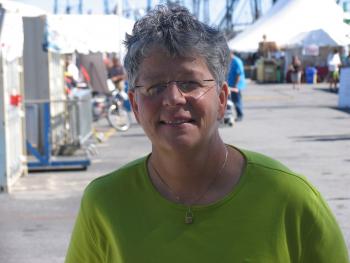Patricia Gerrior

The Working Waterfront Festival Community Documentation Project
This project documents the history and culture of the commercial fishing industry and other port trades. The project began in 2004 in conjunction with the Working Waterfront Festival, an annual, educational celebration of commercial fishing culture which takes place in New Bedford, MA. Interviewees have included a wide range of individuals connected to the commercial fishing industry and/or other aspects of the port through work or familial ties. While the majority of interviewees are from the port of New Bedford, the project has also documented numerous individuals from other ports around the country. Folklorist and Festival Director Laura Orleans and Community Scholar and Associate Director Kirsten Bendiksen are project leaders. The original recordings reside at the National Council for the Traditional Arts in Maryland with listening copies housed at the Festival's New Bedford office.
Janice Gadaire Fleuriel
Patricia Gerrior is a retired fisheries biologist with a career spanning over 35 years in the federal government. She has worked extensively in New Bedford and has seen significant changes in the field over the years. Gerrior has been involved in various aspects of fisheries science, including the Fisheries Observer Program, regulations, stock cycles/declines, and marine mammal/right whales research. She has also worked with the commercial shipping industry. Gerrior has been a strong advocate for women in the field, facing and overcoming discrimination during her career. She is a member of the Women's Fisheries Network and has worked to increase understanding and appreciation of the role of women in the industry.
Scope and Content Note
This interview with Patricia Gerrior, conducted by Janice Gadaire Fleuriel on September 23, 2007, provides a comprehensive look into Gerrior's career as a fisheries biologist and her experiences as a woman in the field. Gerrior discusses her work in various aspects of fisheries science, including her involvement in the Fisheries Observer Program and her research on marine mammals and right whales. She also shares her experiences working with the commercial shipping industry and attending monthly port meetings in Boston and Rhode Island. Gerrior recounts instances of gender discrimination she faced in her career and her efforts to advocate for women in the field [3]. She also discusses her membership in the Women's Fisheries Network and her desire for festival visitors to better understand the hard life of fishing and the significant role women play in the industry. The interview also includes Gerrior's reflections on changes she has observed in the field over her 35-year career, her retirement, and her continued involvement in the field as a consultant. She shares anecdotes about her interactions with fishermen, including a memorable incident involving a captain who disregarded regulations even in the presence of an observer. The interview concludes with Gerrior's thoughts on the importance of unbiased data collection in fisheries science.
Please Note: The oral histories in this collection are protected by copyright and have been created for educational, research and personal use as described by the Fair Use Doctrine in the U.S. Copyright law. Please reach out Voices@noaa.gov to let us know how these interviews are being used in your research, project, exhibit, etc. The Voices staff can help provide other useful resources related to your inquiry.
The NOAA mission is to understand and predict changes in climate, weather, oceans, and coasts, to share that knowledge and information with others, and to conserve and manage coastal and marine ecosystems and resources. The Voices Oral History Archives offers public access to a wide range of accounts, including historical materials that are products of their particular times, and may contain offensive language or negative stereotypes.
Voices Oral History Archives does not verify the accuracy of materials submitted to us. The opinions expressed in the interviews are those of the interviewee only. The interviews here have been made available to the public only after the interviewer has confirmed that they have obtained consent.
